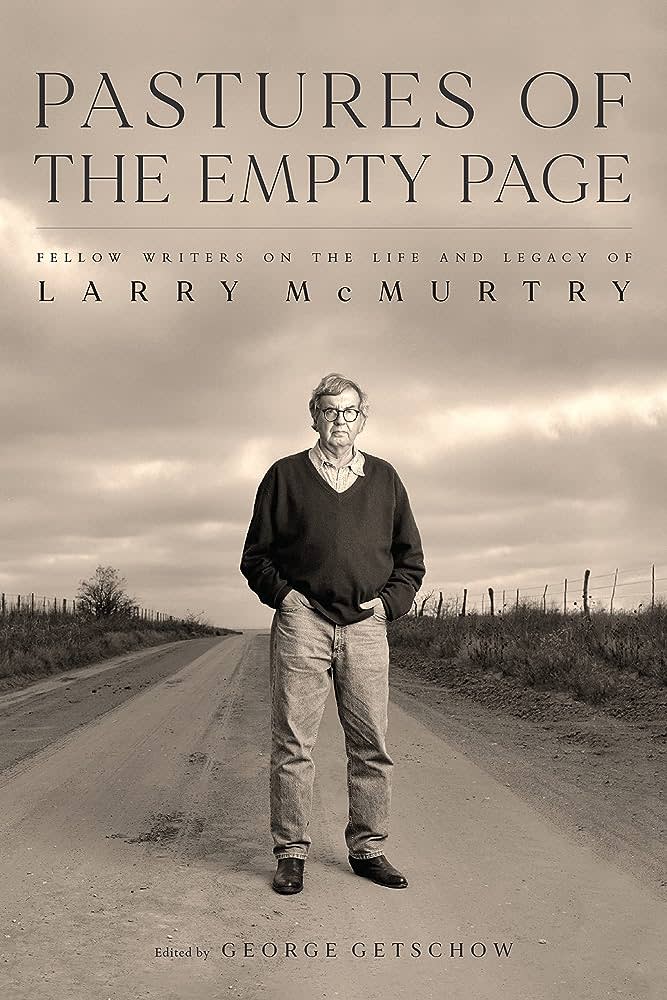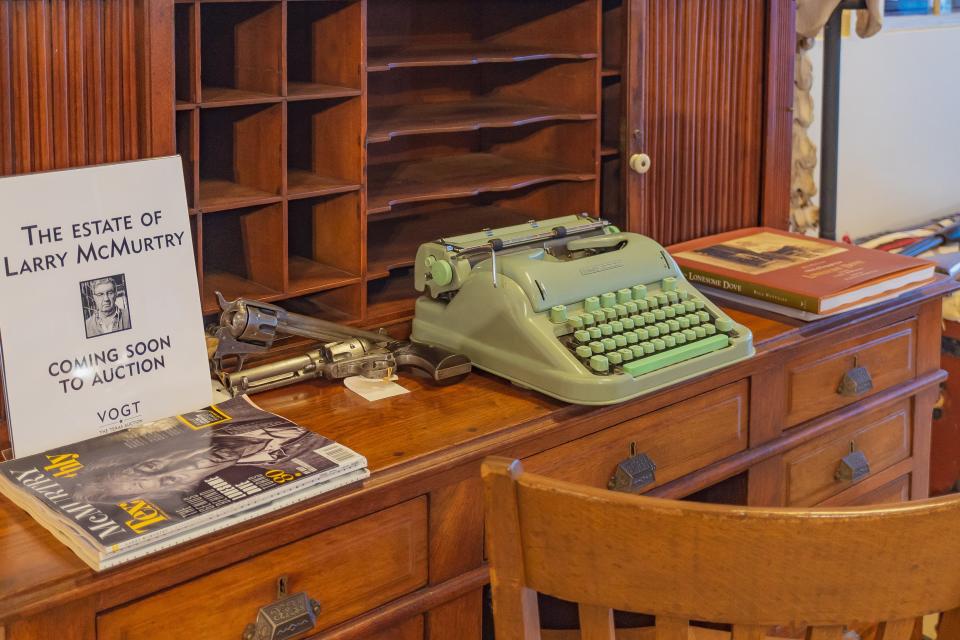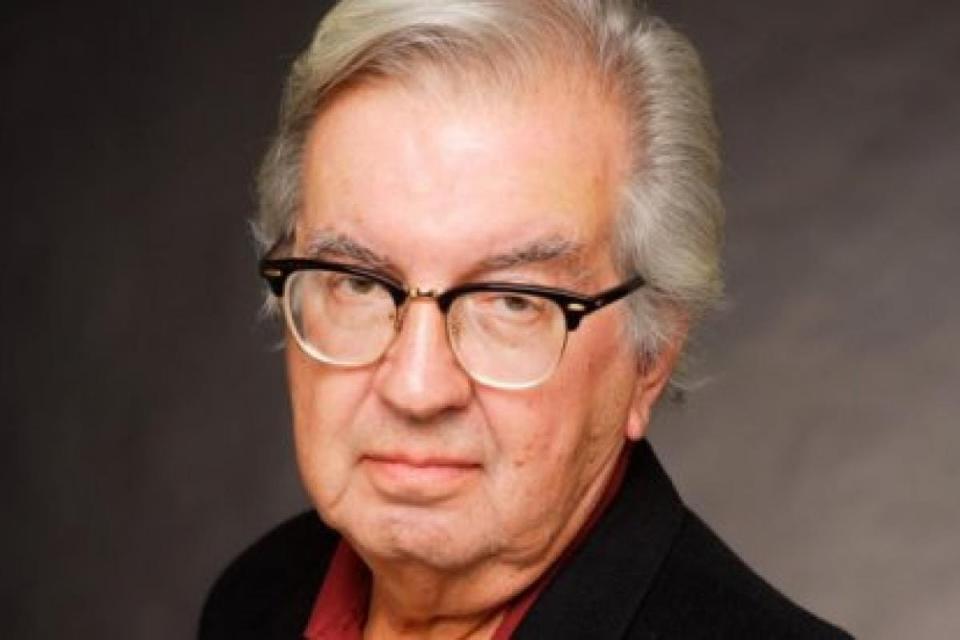Top Texas writers lionize Larry McMurtry in absorbing new book 'Pastures of the Empty Page'

- Oops!Something went wrong.Please try again later.
When one of the greatest Texas writers dies, other writers pay close attention.
That's the premise behind "Pastures of the Empty Page: Fellow Writers on the Life and Legacy of Larry McMurtry," just out from University of Texas Press.
McMurtry died March 25, 2021 at age 84. My colleague, Eric Webb, and I rushed out a news obituary, which covered some high points in McMurtry's life and work.
How I wish "Pastures of the Empty Page" and its 38 respectful tributes to McMurtry had been available at that time.
Editor George Getschow, director of the Archer City Writers Workshop, pulled together not only the literary contributors — he is one of them — he also drafted people whose lives crossed with that of the creator of "Lonesome Dove" and "The Last Picture Show" in singular ways.
The times it never rained: 3 devastating historic Texas droughts
This book is part eulogy, part memoir, part literary criticism. All of it is absorbing.
Getschow sorts out the writers among those who knew McMurtry in his native Archer County; students of his creative writing classes at Rice University and workshops in Archer City; analysts of his criticism; observers of his prodigious reading and bookselling; along with his close collaborators and confidants. The final four essays consider McMurtry's legacy. Those pages are reserved for Stephen Harrigan, Alfredo Corchado, W.K. Stratton and Lawrence Wright.
At some point in the future, I'll pick up "Larry McMurtry: A Life," a well-received biography by Tracy Daugherty (St. Martin's). Another impulse is to read or reread all of McMurtry's books. Since he wrote dozens, that might take the rest of my life.
In the meantime, I'm binging on his movies and TV shows for future Think, Texas columns.
The man was nothing if not prolific.

'Plain Hershey bars and a glass of Dr Pepper on ice': McMurtry fuel
Among the pleasures of "Pastures of the Empty Page" are the short biographical sketches of the contributors dangled like literary gifts at the end of each piece. I don't have space to republish any of those today. Instead, I'll share just a few short excerpts from their writing on McMurtry.
Diana Ossana (McMurtry's writing collaborator for 30 years, which included their Oscar-winning screenplay for "Brokeback Mountain." McMurtry often stayed with Ossana at her home in Tucson, Arizona): So began our lives with Larry. He parked one of several manual Hermes 3000 typewriters, his writing model of choice for most of this career, on a desk in the guest room to write his five pages a day every morning.
He kept a thick supply of blank paper on the left side of the Hermes while a pile of written pages grew exponentially on the right side. Resting in front of the typewriter was a plain manila folder with his stirrup letterhead, the stationary he used to write letters, special notes, manifestos on the contents of our refrigerator, or an ode in defense of butter and bacon. Extra typewriter ribbons and Pilot's extra-fine-point rolling ball pens lived in a cigar box on the table to the right of his written pages.
More: University of Texas' Michener Center creates Steinbeck Writers' Retreat in Sag Harbor
A supply of plain Hershey bars and a glass of Dr Pepper on ice rested above the blank pages on the left. Ever the epicurean, Larry would sometimes have a glass of Dr Pepper and a glass of milk on the table. We kept five or six retired Hermes from which to cabbage parts. We got used to the sound of the typewriter each day, and it became reassuring to hear the clickety-clack of those keys on the mornings he was with us.
It's a ghost sound I sometimes hear even now during the early morning moments crossing between dreaming and waking.
'Impelled to walk the perimeter': The McMurtry ranch
George Getschow (director of the Archer City Writers Workshop and editor of "Pastures of the Empty Page."): It looks like any other cattle gate in rural Texas — as crude and rough as the ranch behind it. A rusted stirrup, the ranch brand, is mounted on top, and its white paint is as rigid and cracked as the ground beneath.
But this is no ordinary gate. It marks the entry to the McMurtry ranch, a scruffy plateau bordered by rocky ledges known by locals as Idiot Ridge. It's the place where stories were told and passed around even before Larry McMurtry was born in 1936. He would be one of the most influential Western writers of the 20th century, shooting holes in romantic portrayals of the Old West.
'A lifeline question': Andrés Tijerina on life, war, Mexican-Americans in Texas history
Beyond the cattle gate, a dirt road leads up to a mesquite-covered hill. Here, over 100 years earlier, Larry's grandparents unhitched their wagon and made a life, and it's the spot where Larry's life as a storyteller began. Throughout his life, before starting work on any of his novels, Larry felt impelled to walk the perimeter of the McMurtry ranch, gazing upon that hill that would shape his literary destiny.
"To this day," Larry wrote many years later in an autobiographical essay, "if I attempt a rural setting, I invariably produce the contours of the hill where I first walked."

'Ruddering against the idea of the great Texas myth': A discarded faith
Lawrence Wright: (The Pulitzer Prize-winning Austin author and journalist's latest book is "Mr. Texas," a send-up of Texas politics.): Longing is a mood you always bump into with McMurtry. The first of his novels that I read was "Leaving Cheyenne," which is one long heartache on the part of two cowboys for Molly Taylor and her yearning for companionship and understanding.
McMurtry wrote a sentence that I figured would stay with me the rest of my life: "A woman's love is like the morning dew — it's just as as likely to settle on a horse turd as a rose." So true, I thought, as I was 19 and loveless.
Texas road trip: 10 things you absolutely must do in the historic city of Lubbock
McMurtry worked a seam in those early novels, the fraying edge of the Western frontier, a way of life that was at once antiquated and grudgingly modern. He was ruddering against the idea of the great Texas myth, which glorified a way of life that was mostly stultifying and mean. The dust of the cattle drives was still in the air, and the rumble of a gusher lingered in memory, but the residue of the myth was as vacuous as a discarded faith.
McMurtry's characters felt trapped by life, whether they were ranchers or suburbanites or residents of Archer City, the fictional Thalia of "The Last Picture Show."
"The aridity of the small West Texas towns was not all a matter of unforgiving skies, baking heat and rainlessness," he wrote in the autobiographical "Walter Benjamin at the Dairy Queen." "The drought in those towns was social, as well as climatic."
The title of that extended essay was as apt a summation of the confluences that made up Larry McMurtry as we are likely to find.
'Read, read, read': Advice to young writers
Bill Marvel (The journalist and author worked as art critic and arts editor for the National Observer and senior staff writer for the Dallas Morning News. "The Rock Island Line," his history of the railroad, was published in 2013.): Before he was anything else — cowboy, author, celebrity — Larry McMurtry was a man of books, a reader.
He frequently confessed that he started buying and selling books in order to read them. Asked what advice he would give to an aspiring author, "Read," he said. "Read, read, read."
'Absolute pinnacle of American letters': Texas writers talk about the late Cormac McCarthy
That's the Larry McMurtry I knew, the reading Larry. His work habits were disciplined. He began every day, seven days a week, seated at the big mahogany table in the dining room of his Archer City home, a stack of fresh paper stacked next to his ancient Hermes typewriter. There for a few hours he would attend to the business of writing.
But Larry's true love wasn't writing.
"I spin out my daily pages as rapidly as possible," he said, "in order to get back to whatever I'm reading."
The reading fed the writing. "If you're going to write fiction," he once told a group of young writers seated around the table at Booked Up One, the flagship of his fleet of Archer City bookshops, "you should read Tolstoy and the Russians. Flaubert and the French. Dickens, George Eliot, Dreiser, Twain, and on and on."
On and on was almost anything he encountered.
Of the 450,000 volumes that eventually crossed the loading dock into his Archer City book empire, he claimed to sample at least a page or two of each book.
Michael Barnes writes about the people, places, culture and history of Austin and Texas. He can be reached at mbarnes@gannett.com. Sign up for the free weekly digital newsletter, Think, Texas, at statesman.com/newsletters, or at the newsletter page of your local USA Today Network paper.
This article originally appeared on Austin American-Statesman: Writes say why Larry McMurtry looms so large in Texas culture

